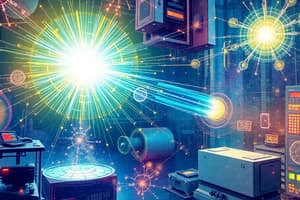Podcast
Questions and Answers
What is the primary function of a mass spectrometer?
What is the primary function of a mass spectrometer?
- To analyze the structure of a gas phase molecule
- To detect the relative abundance of ionic species
- To generate charged molecules or fragments (correct)
- To separate ions based on their mass
What happens to atoms when they become ions?
What happens to atoms when they become ions?
- They lose or gain protons
- They lose or gain neutrons
- They lose or gain molecules
- They lose or gain electrons (correct)
What is the basis for separating ions in a mass spectrometer?
What is the basis for separating ions in a mass spectrometer?
- Their atomic number
- Their charge alone
- Their mass alone
- Their mass-to-charge ratio (correct)
What is recorded or measured at the end of the mass spectrometry process?
What is recorded or measured at the end of the mass spectrometry process?
What is the term for a group of electrically charged atoms?
What is the term for a group of electrically charged atoms?
What is the primary goal of ionizing a gas phase molecule in a mass spectrometer?
What is the primary goal of ionizing a gas phase molecule in a mass spectrometer?
What is the result of an atom losing or gaining electrons?
What is the result of an atom losing or gaining electrons?
What is the relationship between the mass and charge of an ion in a mass spectrometer?
What is the relationship between the mass and charge of an ion in a mass spectrometer?
What is the final step in the mass spectrometry process?
What is the final step in the mass spectrometry process?
What is an ionic species?
What is an ionic species?
Flashcards are hidden until you start studying
Study Notes
Mass Spectrometry
- A mass spectrometer generates charged molecules or fragments of an analyte in a gas phase.
- The objective of a mass spectrometer is to ionize a gas phase molecule and analyze the masses of its produced ions.
Ionization
- Ions are electrically charged atoms or groups of atoms formed when atoms lose or gain electrons.
- Atoms can become negatively charged (gain electrons) or positively charged (lose electrons) ions.
Separation and Detection
- Produced ions are separated according to their mass-to-charge ratio (m/z).
- The relative abundance of each ionic species present is recorded (measured) after separation.
Mass Spectrometry
- A mass spectrometer generates charged molecules or fragments of an analyte in a gas phase.
- The objective of a mass spectrometer is to ionize a gas phase molecule and analyze the masses of its produced ions.
Ionization
- Ions are electrically charged atoms or groups of atoms formed when atoms lose or gain electrons.
- Atoms can become negatively charged (gain electrons) or positively charged (lose electrons) ions.
Separation and Detection
- Produced ions are separated according to their mass-to-charge ratio (m/z).
- The relative abundance of each ionic species present is recorded (measured) after separation.
Studying That Suits You
Use AI to generate personalized quizzes and flashcards to suit your learning preferences.




